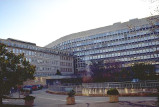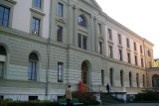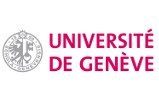1. Brief History
The University celebrated its 450th anniversary in 2009. Jean Calvin was the driving force behind the creation of the Geneva Academy in 1559, the precursor of the present university.
The Academy was originally conceived as a theological and humanist seminary, the guardian of Reform doctrine. During the Enlightenment distinguished scholars found inspiration here and new disciplines were introduced such as physical and natural sciences, law and philosophy.
The Academy shed its ecclesiastical vocation during the political and social upheavals of the 19th century and, following the establishment of the Faculty of Medicine in 1873, it became a university.
Contemporary researchers continue to open up new frontiers of knowledge such as the discovery of exoplanets or superconducting materials while humanist values are still strongly integrated into both research and teaching.
The UNIGE is a generalist University attaching great importance to the unity between teaching and research. It leads research in all teaching domains. This wide spectrum of research areas ensures an almost universal scientific expertise which allows the UNIGE to answer the multiple challenges of the current world.
Outstanding Alumni and Faculty Members include:
- Paul R. Krugman, 2008 Nobel Prize in Economic Sciences, New Trade Theory, New Economic Geography
- Professor Stanislav Smirnov was granted the Fields Medal which is considered as the equivalent of the Nobel Prize in mathematics,
- Professor Michel Mayor obtained the Vicktor Ambartsumian International Prize, one of the most important distinctions in the field of astrophysics, and
- Professor Antoine Bailly received the Vautrin Lud International Geography Prize, the highest award that can be gained in the field of geography




2. Key Facts
Established:
1559
Type:
Public
Structure:
- Faculty of Science
- Faculty of Medicine
- Faculty of Humanities
- Faculty of Social Sciences
- Faculty of Economics and Management
- Faculty of Law
- Faculty of Theology
- Faculty of Psychology and Educational Sciences
- Faculty of Translation and Interpreting
Staff
4,274 employees of 104 different nationalities. 11% are professors, 53% teaching and research collaborators.
Students:
16,700 students from 152 countries
Endowment:
A large part of research funding relies on resources supplementary to the ordinary budget of the University of Geneva (UNIGE). UNIGE’s researchers annually obtain more than 200 million Swiss Francs, earmarked for research, from sources such as: the Swiss National Science Foundation (SNSF), the European Research Programs (FP7), national and international programs, private and public foundations, etc.

3. Research
Mission / Strategy
The University is committed to unlocking knowledge and responding to social change. It actively promotes equal opportunities and broad access to high-quality education. The wide range of disciplines offered by the University, the only tertiary-level institution of its kind in the region, is reflected in its interdisciplinary approach to research and in its quest for educational excellence.
The University Strategic Plan proposes seven overarching objectives:
- Maintain the priorities
- Propose inspiring education
- Ensure excellence in research
- Reinforce the regional presence of the University
- Strengthen the international dimension
- Improve governance
- Promote equal opportunities
These objectives are developed through more than fifty actions and a set of indicators monitor the extent to which they are being implemented.
Outstanding Achievements and Patents:
The University of Geneva offers access to cutting-edge research infrastructures like:
- One of the most powerful computer in the world
- A unique facility dedicated to brain and behavioral studies
- A biomedical imaging center equipped with the most powerful MRI (Magnetic resonance imaging) in the world (14 Tesla)
- 1.5 millions printed documents
- 65'000 electronic academic journals
- 400'000 ebooks
- 700 online databases
- More than 34‘800 records in the Archive ouverte UNIGE
Spin-offs:
- UNI Dufour
- UNI Bastions
- Sciences I, II, III
- UNI Mail/ UNI Pignon
- CMU, Centre Médical universitaire
- Batelle
4. Partnerships and Programs
Strategic Partnerships
- Part of G3, with Université de Montréal (Canada) and Université libre de Bruxelles (Belgium)
- Princeton University (USA)
- Yonsei University (South Korea)
- University of Sydney (Australia)
- Boston University (USA)
- Renmin University (China)
- UCLA, University of California, Los Angeles (USA)
- (and many other partners institutions for specific activities)
Academic Partner Networks:
- LERU, League of European Research Universities
- AUF Agence universitaire de la Francophonie
- Coimbra Group
- IFPU International Forum of Public Universities
- Convention CREPUQ
- Talloires Network
- International Association of Universities
- European University Association
- OECD Higher Education Programme
- Palestinian European Academic Cooperation in Education
- Scholars at Risk Network
- World Economic Forum: Knowledge Advisory Group
- UN Academic Impact
Student Programs:
- Erasmus
- Numerous exchange partners outside of Europe
- Specific programs within the networks mentioned above
Affiliations:
Partner institutions are:
- Graduate Institute of International and Development Studies (IHEID)
- Bossey Ecumenical Institute
5. Trivia
Nickname:
UNIGE
Motto:
Post tenebras lux
(After darkness, there is light)
This motto was adopted in 1542 by the Republic of Geneva.

Miscellaneous:
The famous fictional spy James Bond briefly studied at the University of Geneva, as did his creator Ian Fleming.

